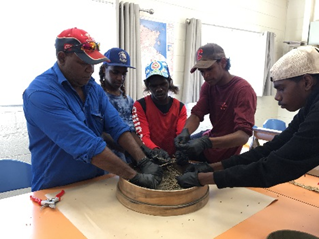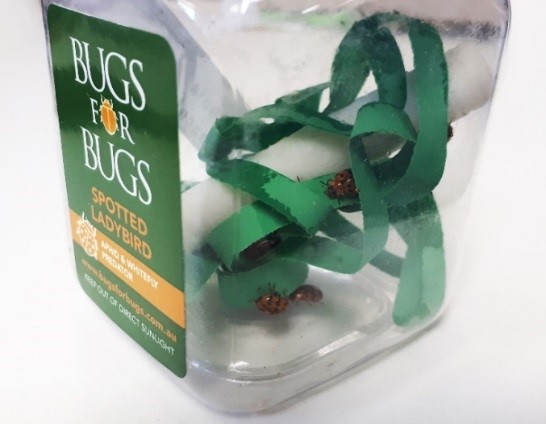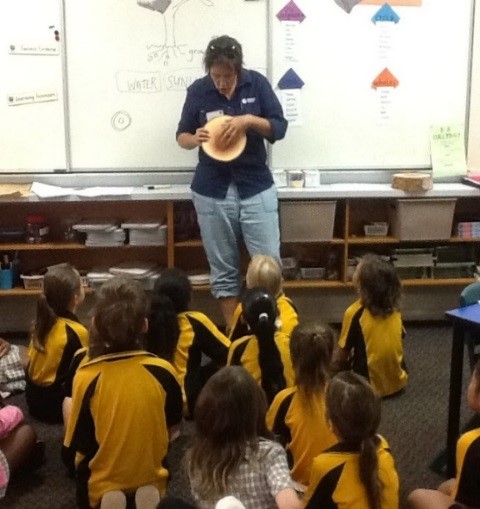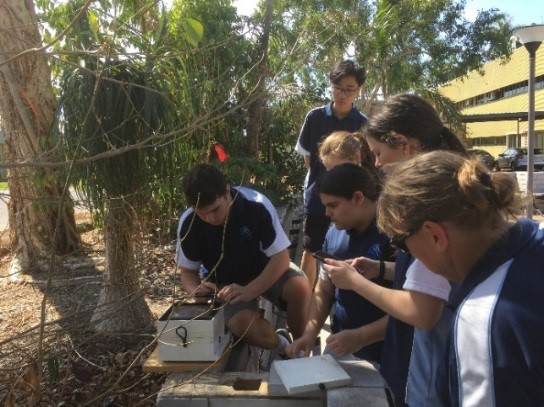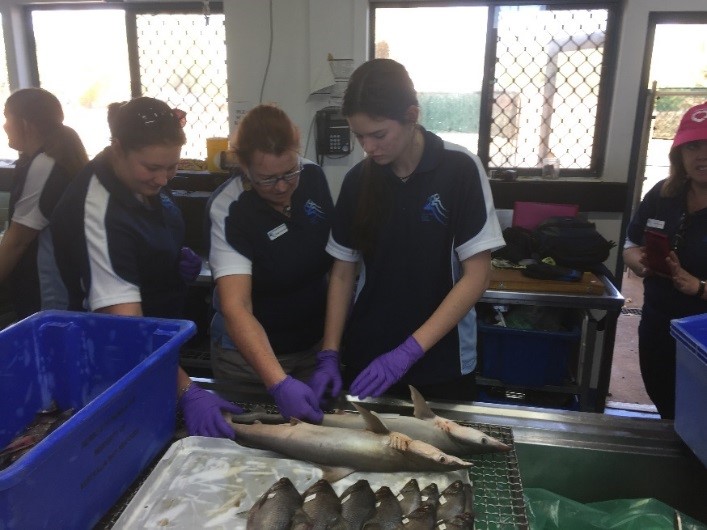A bright future: students of all ages learning about horticulture
Sarah Tsai, Maddison Clonan, Dallas Anson, Chelsea Moore Agriculture Branch
From a central Australian high school visit, science week activities with primary school children, national tree day activities and Vocational Education and Training(VET) in Alice Springs; staff at the Department of Primary Industry and Resources (DPIR) have recently been hosting visits and working with students of all ages and from all regions.
In Alice Springs, Glen Oliver, Technical Officer – Plant Industries, has been providing hands on experience and training to local VET students. The Department of Education shares facilities with DPIR at AZRI to deliver a number of courses – Certificate III in Agriculture; Certificate II in Rural Operations; Certificate II in Conservation and Land Management and Certificate I in AgriFood Operations under the Pastoral Futures Program. This is a joint partnership between the Central Land Council, Indigenous Land Corporation, NT Cattleman’s Association and DPIR. The program skill sets are developed in consultation with industry, and students often assist AZRI staff at the farm. Recent activities include pollen collection from date flowers.
Glen Oliver showing VET students (Cert I in AgriFood Operations) how to collect pollen from male date flowers.
On another front, DPIR staff helped Wulagi Primary School students enjoy National Science Week with some natural history and horticultural science. The pre-schoolers released ladybugs, donated by Bugs 4 Bugs, into their garden to try to control aphids.
Pre-schoolers from Wulagi Primary School released Bugs 4 Bugs ladybugs into their garden to control aphids.
“It’s so wonderful getting the little kids involved, they get so excited about everything. They can’t believe they are holding real live ladybirds, and many of them have never caught or held a ladybird before”, DPIR staff said.
The older students looked at invertebrates under the microscope and talked about microscopic organisms such as fungi and bacteria (“germs”), which they grew on petri dishes. The event was part of an ongoing collaboration through the STEM professionals in schools program, and funding from a National Science Week grant. STEM in Schools is a CSIRO led national volunteer program that facilitates partnerships between schools and STEM professionals (Science, Technology, Engineering and Maths) to bring their work and inspiration into the classroom. For more information on the program click here.
Growing future foresters
Dallas Anson, Technical Officer from the Plant Industries Division recently joined Frank Miller from African Mahogany Australia (AMA) to deliver a National Tree Day lesson to Nightcliff Primary Grade 1 and 2 students.
Dallas Anson talking about tree rings with Nightcliff Primary School students.
The lesson, Every tree for itself, taught the students about the various physiological responses trees have when in situations of abundance or limitation of the three key resources; water, sunlight and nutrients.
After delivering the session and playing a game based on the lesson concepts, Dallas, Frank and the students paid a visit to the schoolyard where they planted a variety of trees and grass species in Finch's Garden. The plants were contributed to the school by the department and AMA.
"The students thoroughly enjoyed getting their hands dirty and were very enthusiastic about being responsible for the ongoing care and maintenance of the species we planted," Dallas said.
The lesson is one of a suite of national curriculum approved modules from Forest Learning, a website where forestry specialists and educators collaborate to develop educational resources.
DPIR and AMA are planning continued engagement with Northern Territory primary schools to increase awareness of environmental issues and ignite a passion for forest science in young people.
Centralian school visit
As part of their annual pilgrimage to Darwin for careers advice, Centralian High School students from year 10 visited Berrimah Farm and Darwin Aquaculture Centre to learn about careers in agriculture and fisheries.
Students arrived on the morning of Thursday 16 August and were greeted by Dr Mila Bristow, Research Manager of the Plant Industries Division, who introduced the wide range of career opportunities available to students interested in STEM. Nikki Elliot, Bacteriologist, then led the students through a site tour of the Berrimah Veterinary Laboratory, followed by an inspection of native stingless bee hives and the entomology collection led by Dr Mary Finlay-Doney, Research Entomologist and Haidee Brown, Technical Officer. Plant Industries staff then hosted rice variety tasting and fungal spore identification activities. Over lunch, students were given the opportunity to quiz Dallas Anson, Technical Officer; Dr Matt Hall, Extension Officer and Dr Samantha Cullen, Technical Officer, about their career pathways into science, revealing a range of unique and unconventional career options.
Students learning about native stingless bee hives.
In the afternoon students moved into the fisheries laboratory where they had the opportunity to hold and inspect a range of aquatic specimens collected for anatomical assessments. Dr Mark Grubert, Senior Fisheries Scientist, described the work of the Fisheries Division; and introduced fisheries staff and PhD students from Charles Darwin University. These researchers shared their work on training sea rangers for conservation of Northern Territory coastlines, tagging and tracking local shark species, studying newly identified aquatic species and developing fish protection zones. The students were then given a tour of fisheries vessels.
Students and teachers inspecting the quality of different fish species. To finish off the day, students were treated to a tour of the Darwin Aquaculture Centre on Channel Island. Here aquaculture technicians Paul Armstrong and Morris Pizzutto showed the students breeding systems for sea cucumber, giant clam and barramundi, and described their industry value. Inside a laboratory students studied barramundi at different stages of development, the production of live feed and types of non-living food sources used in aquaculture. To complete the tour, students learned the design of the aquaponics system and competed in a race to build aquaculture cages.
Thank you to all those staff who participated in and assisted in the organisation of the student tour: Mila Bristow, Dave Lovelock, Nikki Elliot, Paul Armstrong, Haidee Brown, Mary Finlay-Doney, Samantha Cullen, Dallas Anson, Matt Hall, Mark Grubert, Ian Hutton (NAILSMA), Grant Johnson, Shane Penny, Amy Kirke (CDU), Paul Armstrong, Morris Pizzutto, Jessie Cagney, and Shanika Arachchi.
Give feedback about this page.
Share this page:
URL copied!
